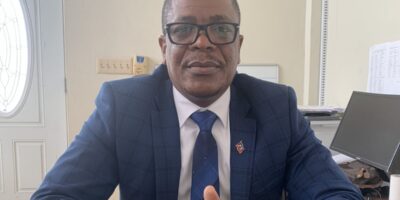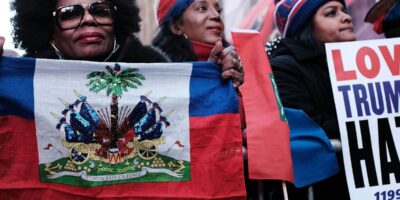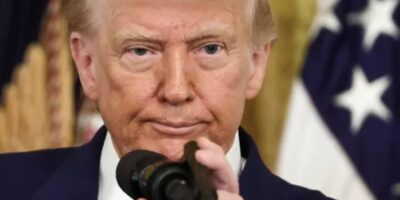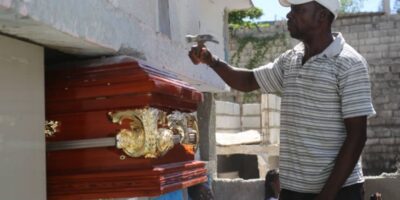Many seem to believe that a change in leadership through another transition will solve everything. However, such changes will not be effective without unity and a clear vision for Haiti’s future
Like many Haitians living abroad, I often find myself dreaming about my homeland. In one vivid dream, I received a letter from my American friend, Peter. A retired US government official with over 30 years of experience, Peter’s career included a posting to Haiti after the devastating 2010 earthquake. We met during that time and forged a strong friendship.
In my dream, our conversation inevitably turned to the current crisis unfolding in Haiti. After the party, I dreamt that Peter had sent me a letter sharing his insights on the situation. Here is what Peter wrote:
My dear friend,
I hope this letter finds you and your family well. It was great to see you at my retirement party. I am truly grateful that you made the trip to celebrate this milestone with me. I don’t know what I will do next but I am excited about this next stage.
Our conversation about Haiti has stayed with me, prompting me to share my thoughts with you. Having retired from my position with the U.S. government, I now have the freedom to speak openly about my experiences working on the Haiti portfolio. My time in Haiti is etched in my memory – filled with enduring friendships and a deep appreciation for the country’s resilience and beauty.
I recognize that many Haitians believe the United States is responsible for Haiti’s current problems. While I cannot defend my government’s actions in this letter, it’s important to understand that every country’s foreign policy is designed to benefit its national interests. As a government official, my primary responsibility was to uphold those interests. From that perspective, I hope to share some insights that I believe can help you and other Haitians develop more effective strategies for engaging with the United States.
On a human level, I deeply empathize with the Haitian people who have endured immense suffering under the rule of colonial powers, including past actions by my own government. The longstanding inequalities and the current insecurity caused by gangs exacerbate an already challenging situation, making life unbearable for most Haitians.
I want to address the perception that the United States holds absolute control over Haiti’s affairs. While it’s true that we do exert considerable influence, to imply that Haitians lack any power of their own would be to deny their agency and resilience. Our influence is more limited than most people realize. Your leaders often exploit this narrative to deflect responsibility for their own actions. As you say in Kreyòl, they want to evade accountability by declaring, « Se pa fòt mwem! »
Your leaders often exploit this narrative to deflect responsibility for their own actions
Our sanctions program is a good example of the limits of our power in Haiti. If we had complete control over Haiti, we wouldn’t need to use our legal system to go after people we know are corrupt. Our legal system can be slow, and even if we succeed in sanctioning someone, they still remain free and can influence events in Haiti. If we had complete control, we would have taken care of it directly in Haiti. We’ve tried to help you reform your justice system, but none of your leaders have made it a priority. Ultimately, it’s up to Haiti to create a fair system that holds all citizens accountable.
Another accusation we face is that the international community selected Mr. Ariel Henry. The truth is that it was your President, Jovenel Moise, who appointed Prime Minister Henry, and the decision was formalized in your official paper, « Le Moniteur. » This process followed Haiti’s laws. This is why Prime Minister Claude Joseph agreed to step down.
The truth is that it was your President, Jovenel Moise, who appointed Prime Minister Henry, and the decision was formalized in your official paper, « Le Moniteur. »
Regarding the claim that we interfere in your political system. It is true that our government makes demands of your officials but those are not edicts. Your officials have the power to refuse them. One clear example is the 2016 election. Our government opposed those elections and did not provide financial support. Despite this, interim President Privert used Haitian funds to hold the elections anyway.
The reality is that your political campaigns are mostly funded by your business elite. The candidates they support then use this money to influence elections by creating armed gangs and vote-buying. Additionally, your economic and political elites create and fund the gangs to protect their interests or eliminate their competitors. Now, those gangs have become powerful and independent, and are terrorizing the population. Blaming the United States or the United Nations for these homegrown problems is ignoring a problem that Haitians themselves have created.
One of the most serious accusations against the United States is that we are providing weapons to the gangs in Haiti. People should understand that gun ownership is deeply ingrained in American society, and some states, like Florida, have relaxed gun laws that allow individuals to purchase firearms relatively easily. However, the illegal trafficking of guns to Haiti is already prohibited by US law. The US has imposed an arms embargo on Haiti, meaning that it is illegal to export weapons to the country. We have also taken steps to curb this illegal activity, particularly in South Miami, a major hub for this trade. Interestingly, many of the traffickers and buyers involved in this illegal activity are Haitians themselves.
I’ve heard activists propose that we should closely inspect every shipment going to Haiti to prevent weapons smuggling. This would be an extremely expensive and time-consuming undertaking. Moreover, it would require us to divert resources away from protecting our citizens to search every container, car, blue drum, old TV and mattress, and the many other potential hiding places Haitian traffickers use to ship weapons and ammunition to Haiti. Even if we could dedicate our resources to this task, those criminals have other routes, including through the Dominican Republic and the drug routes from South America.
Even if we could dedicate our resources to this task, those criminals have other routes, including through the Dominican Republic and the drug routes from South America.
We have a part to play but the real solution to this problem lies within Haiti itself. The country needs to take control of its ports and borders. If Haitians want their country to regain its sovereignty, they must start by protecting their own borders. It’s not feasible to ask our taxpayers to pay for this. Although the US is willing to assist, ultimately, it is up to Haiti to protect its country and its people.
I deeply empathize with the suffering of the Haitian people. The recent statistics about crime and hunger are truly awful. It’s heartbreaking to know that your people are living through such a difficult situation. However, as an American, I have the benefit of being somewhat detached from the immediate crisis. This allows me to consider the broader picture. The growing criminal network in Haiti worries me deeply. It’s not just your problem; it’s causing a migration crisis that affects the entire region. We all want a stable Haiti, both for the region’s well-being and to prevent crises like last year’s situation at the US-Mexico border, which affects our internal politics.
That’s why my government supports international efforts to assist your police. In fact, several surveys show nearly 70% of Haitians support the UN-approved Kenya-led mission. Three months later, the people living under the threat of kidnapping and murder are asking why it’s taking so long for the mission to arrive. They believe the delay is intentional and that the international community doesn’t truly want to help Haiti. They may not know that one Haitian organization, supported by its partners in the US, is funding the case in Kenya that’s blocking the mobilization. These civil society groups, despite lacking accountability to the Haitian people and offering no alternative solutions, are funding this legal action and being secretive about it. Ironically, they would likely turn around and blame the international community if they succeeded in stopping the mission.
Another point that I hear about is the cost of the mission. The Kenyan government has estimated it will need at least $600 million US dollars. This is a lot of money, and many Haitians are asking why this couldn’t be used to strengthen Haiti’s own army and police force.
As you know, each country decides independently when and how to provide aid to Haiti. All of them do so based on their foreign policies and priorities. These are called « bilateral agreements. » However, no single country wanted to send its armed forces to Haiti for two reasons. One is that no one wants to own Haiti’s problems. The other is the concern of being seen as invaders. This is why the mission had to be approved through the United Nations (UN), of which Haiti is a member. Funding a UN mission isn’t as simple or direct as a bilateral agreement. The UN cannot simply raise funds for a mission and redirect it to Haiti so it can build its military or police. The UN doesn’t have that power because building armed forces is each nation’s sovereign responsibility. Furthermore, expecting the international community to hand over $600 million to a government deemed illegitimate by many is simply unreasonable.
The UN doesn’t have that power because building armed forces is each nation’s sovereign responsibility
For us in the US, our aid follows strict laws and rules passed by Congress. We subsidize your officers’ salary and pay for their training. We also invest heavily in Haiti’s infrastructure, education, healthcare, and security. These funds come from our taxpayers, and how we use them must align with our laws.
As I said, the ongoing violence and instability in Haiti are deeply concerning. Many seem to believe that a change in leadership through another transition will solve everything. However, such changes may not be effective without unity and a clear vision for Haiti’s future. One thing is clear to me: neither your current government nor the opposition has broad support from the people.
For Haitians, both in Haiti and overseas, the way forward involves electing leaders who are broadly accepted as legitimate and can effectively engage with the international community. These leaders should define Haiti’s policy goals and the limits of the international community in their country’s affairs.. Strengthening Haiti’s sovereignty starts with securing its borders and ports, which is essential to reducing external influences and controlling illegal activities. The Haitian diaspora should strive for as unified a voice as possible, ensuring that their recommendations and demands are consistent and impactful in international discussions.
This approach, combined with strategic engagement with countries like mine, will be crucial in aligning international support with Haiti’s interests and sovereignty.
I hope you will forgive the length of this letter, but I believe it was essential to present a different point of view that might broaden your understanding. Seeing things from another perspective is crucial, as it can foster more nuanced discussions and collaborations, leading to more effective solutions for the challenges your country faces.
Until we see each other again, I wish you the best and pray that the Haitian people will find some peace during this holiday season.
Cover Image : | © Jean Feguens Regala/AyiboPost
Stay in touch with AyiboPost through :
► Our WhatsApp channel : click here
► Our WhatsApp Community : click here
► Our Telegram canal : click here







Comments